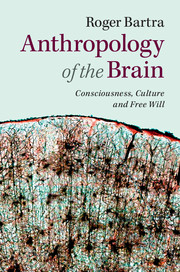Book contents
- Frontmatter
- Contents
- Preface
- Part I Consciousness and symbolic systems
- 1 The hypothesis
- 2 Evolution of the brain
- 3 Brain plasticity
- 4 Is there an internal language?
- 5 Amputations and supputations
- 6 The atrophied exocerebrum
- 7 The symbolic substitution system
- 8 Neuronal mirrors
- 9 Consciousness within hand’s reach
- 10 Outside and inside: the immense blue
- 11 The musical spheres of consciousness
- 12 Artificial memory
- 13 The lost soul
- Part II Brain and free will
- Bibliography
- Index
1 - The hypothesis
Published online by Cambridge University Press: 05 June 2014
- Frontmatter
- Contents
- Preface
- Part I Consciousness and symbolic systems
- 1 The hypothesis
- 2 Evolution of the brain
- 3 Brain plasticity
- 4 Is there an internal language?
- 5 Amputations and supputations
- 6 The atrophied exocerebrum
- 7 The symbolic substitution system
- 8 Neuronal mirrors
- 9 Consciousness within hand’s reach
- 10 Outside and inside: the immense blue
- 11 The musical spheres of consciousness
- 12 Artificial memory
- 13 The lost soul
- Part II Brain and free will
- Bibliography
- Index
Summary
At the beginning of the third millennium the human brain still remains a mysterious organ unwilling to give up its secrets. Scientists have not yet been able to understand the neuronal mechanisms that sustain thought and consciousness. Many of these functions occur in the cerebral cortex, a tissue that resembles the rind of a large fruit, such as a papaya, that has been squeezed and wrinkled upon being inserted into our cranium. I would like to extract this cortex so that, by unfolding its sulci, I could spread it out like a handkerchief over my desk in front of me to examine its texture. If that were possible, a beautiful grey cloth, two or three handspans wide, would now be lying before my eyes. I could run my gaze over the thin surface, looking for signs that would allow me to decipher the mystery hidden in the network connecting billions of neurons.
Neurobiologists have managed to do something similar. Thanks to the refinement of new methods for observing the nervous system (such as positron emission tomography and functional magnetic resonance imaging) scientists have rapidly advanced their studies of brain functions. In their euphoria they baptized the last ten years of the twentieth century as the “decade of the brain,” and many believed they were very close to the solution of one of the greatest mysteries facing science. However, even though colorful images of the marvelous interior landscape of the brain unfolded before our eyes, they were not able to explain the neuronal mechanisms of thought and consciousness.
- Type
- Chapter
- Information
- Anthropology of the BrainConsciousness, Culture, and Free Will, pp. 3 - 7Publisher: Cambridge University PressPrint publication year: 2014



